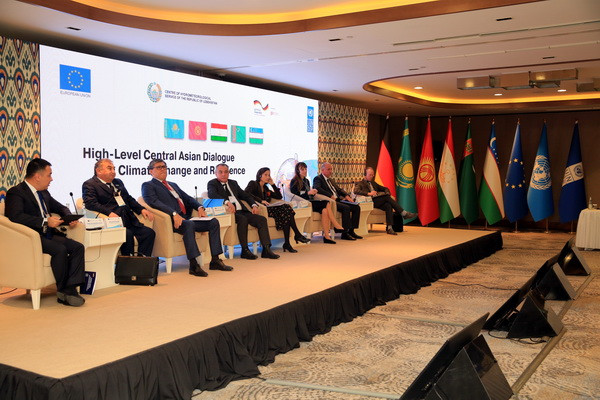
Central Asia needs to take more proactive action on climate change risks
Tashkent, Uzbekistan (UzDaily.com) -- A regional conference timed to coincide with COP27 calls on all Central Asian states to join efforts in developing a reasonable balance between climate change mitigation and adaptation to it.
Central Asia is warming faster than the world average. Average annual temperatures have increased by 0.5 degrees Celsius over the past three decades and are projected to increase by 2.0 to 5.7 degrees Celsius by 2085. The increase in the frequency and speed of extreme weather events and disasters threatens physical security, critical infrastructure, and access to health care and education.
Against this background, a high-level conference on climate change on the theme “From global knowledge to local solutions: climate-resilient institutions in Central Asia” began its work in Tashkent this week. The UNDP organized the event jointly with the Government of Germany (GIZ) and in cooperation with Uzhydromet, the Ministry of Foreign Affairs, the Ministry of Agriculture and the Ministry of Water Resources.
More than 100 delegates held a compression dialogue around environmental threats and called on all Central Asian states to join forces to strike a reasonable balance between climate change mitigation and adaptation.
UNDP Resident Representative in Uzbekistan Matilda Dimovska noted that the conference demonstrates an excellent example of joint actions of international organizations to mitigate the effects of climate change and adapt to them in Central Asia. "It is clear that no single country or organization can make an effective contribution alone," she said.
“But by working together, we can make great strides in overcoming this existential threat to humanity.”
Today, nine out of every ten natural disasters are climate-related. In addition, climate change is likely to impact local and regional economies as overexploitation and resource scarcity are predicted to affect key industries such as agriculture, energy and other water-dependent activities. Thus, the participants focused on improving the regional dialogue and raising the awareness of vulnerable sectors of the economy about climate change and resilience. They stressed the importance of strengthening community-based climate-related early warning and prevention measures in the transboundary areas of Central Asia.
Participants noted that given the transboundary nature of climate risks and shared natural resources, climate action can be seen as a starting point for strengthening regional cooperation. In recent years, the states of Central Asia - Kazakhstan, the Kyrgyz Republic, Tajikistan, Turkmenistan and Uzbekistan - have made significant progress in adapting to climate change and achieving green growth based on natural capital. They initiated the creation of cross-sectoral cooperation on climate change mitigation and adaptation, which affects the transboundary management of natural resources.
UNDP in Uzbekistan organized a one-day event under the project "Climate Change and Resilience in Central Asia" with the financial support of the European Union and in close cooperation with the GIZ Initiative "Green Central Asia" - Enhancing the resilience of the environment, climate and water resources funded by Ministry of Foreign Affairs of Germany.
The project "Climate Change and Resilience in Central Asia" aims to support stability and climate-resilient development in the Fergana Valley, a cross-border area between the Kyrgyz Republic, the Republic of Tajikistan and the Republic of Uzbekistan. One of the key activities is the improvement of river basin management plans to improve the sustainable use of water resources in the national part of the Ferghana Valley.
In particular, the project provides various trainings for senior management and experts. Under the project, baseline studies were carried out that revealed a lack of awareness among sector specialists about the link between climate instability risks, socio-economic development and related adaptation measures in the Ferghana Valley. The project also selected three pilot river basins that included existing climate-related risks to promote sustainability and resilience in the Fergana region.